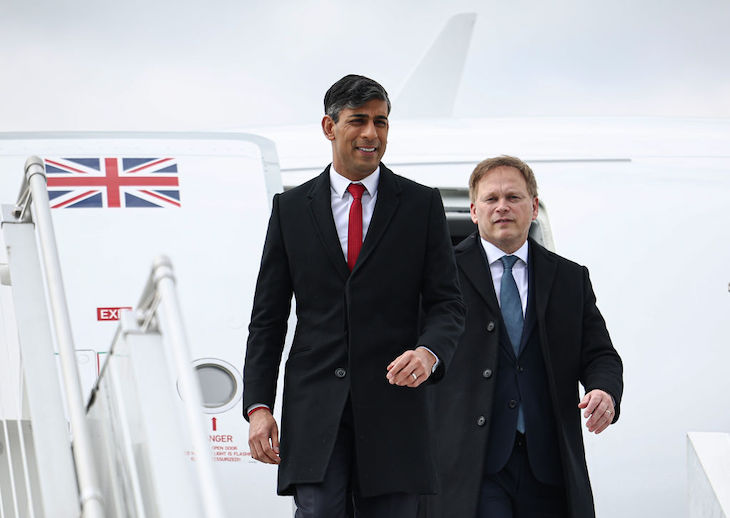Britain is putting its defence industry on a ‘war-footing’, the Prime Minister has said, as he vowed to boost spending to 2.5 per cent of GDP by 2030. It was only a matter of time that Rishi Sunak made such an announcement. After all, Russia’s invasion of Ukraine illustrated a simple truth: that the world is more dangerous now than for a generation, and nations will need to increase their defence spending if they want to protect themselves and their interests. Grant Shapps, Penny Mordaunt and Tom Tugendhat had all expounded this view from within government, and now it seems the PM has given his seal of approval.
The money is desperately needed
Sunak’s pledge, made on a European visit which takes in Poland and Germany, means tens of billions of pounds more for the armed forces. The cash injection would push the UK comfortably beyond the two per cent target set by Nato: even this year, only 18 of the alliance’s 32 members are expected to meet that commitment.
The money is desperately needed. Last month, the House of Commons Public Accounts Committee revealed a £16.9 billion hole in the government’s Defence Equipment Plan, the largest deficit in any of the Ministry of Defence’s 12 annually issued plans since 2012. Some felt that figure was a low estimate and that the true gap between capability and resources was closer to £20 billion.
The spending watchdog’s verdict came close behind a stinging condemnation from the Defence Committee on the overall readiness of the armed forces for a major military conflict. Ready for War? was brutal and explicit:
‘Either the Ministry of Defence must be fully funded to engage in operations whilst also developing warfighting readiness; or the Government must reduce the operational burden on the Armed Forces.’
The government has spent months trying to paper over these yawning cracks with positive-sounding statements about ‘aspirations’ to spend more on defence when the economic circumstances are right. It’s been clear for some time that the Army was too small, that the UK had simply lost the ability to deploy some capabilities and that bold posturing on the Trident nuclear deterrent was a huge and unscrutinised spending commitment. Sunak’s new commitment is a welcome shift – but is it enough?
Moving from two per cent to 2.5 per cent will only take the UK back to the spending levels of the late 2000s, when we had substantial numbers of troops deployed in Afghanistan and, though drawing down, in Iraq. The last significant drop in expenditure was when we cashed in the ‘peace dividend’ of the early 1990s, going from spending 4.1 per cent of GDP in 1991 to 2.6 per cent by 1997. That seemed plausible and sustainable then, and we should not be distracted by chastising ourselves over judgements made 25 or 30 years ago.
Now the Labour party must respond. Will it commit to 2.5 per cent?
It is clear now, however, that we are both over-committed and under-resourced, quite an impressive achievement. The government’s so-called Integrated Review of 2021, Global Britain in a competitive age, was a worthy attempt to look at our international interests and commitments in the round. It was drawn up under the guidance of Professor John Bew, the deep-thinking scholar at King’s College London who has advised Boris Johnson, Liz Truss and now Rishi Sunak on foreign affairs despite no profound attachment to the Conservative Party; and it was ‘refreshed’ in March 2023 as Responding to a more contested and volatile world. But these good intentions have foundered on the Ministry of Defence’s deployment of the Pollyanna Syndrome, as senior ministers, officials and military officers have simply refused to accept that the problems of resourcing, recruitment and procurement are there.
The PM seems, at last, to have got the memo. A commitment to spend 2.5 per cent of GDP on defence by 2030 is modest enough – it would still be less than a sixth of what we spend on health, yet is literally providing for the nation’s safety and security at home and abroad – and I am not alone in thinking it must be a milestone on the way to something much more like three per cent. But it is definite progress, will inject much-needed cash into the armed forces and sends a powerful signal to allies and adversaries that we are serious about our place in the world.
Of course this comes in the shadow of a general election campaign, and even someone with Rishi Sunak’s levels of self-assurance must recognise his path to victory is narrow and steep, if it is possible at all. But the Conservatives are laying their cards on the table, and must be held to those commitments. Now the Labour party must respond. Will it commit to 2.5 per cent? Does it agree the armed forces need more money? Or does it believe defence can be had cheaper than that? Time for Keir Starmer to show his hand.







Comments